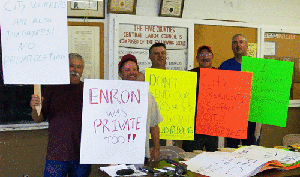The City of Redding stepped back from its plan to use ballot initiatives to shift pension costs onto employees and to eliminate retiree health care benefits for future hires.
The advisory ballot initiatives, planned for June, would have asked voters to weigh in on the controversial proposals to address budget problems by gutting benefits for IBEW members in the city’s Electric and Maintenance departments.
“The ballot initiatives were a bad idea from the get-go,” said IBEW Local 1245 Senior Business Representative Ray Thomas. “They tried to undermine what we achieved through years of bargaining, and in the end they wouldn’t have achieved the savings the city was seeking.”
The proposed ballot initiatives were dealt a serious blow in February when a study by UC Davis’s Center for Regional Change found that the measures would likely have “little impact” on the city’s short-term budget crisis and could “potentially undermine future government essential services.”

Helping prepare signs for one of the protests at Redding City Hall are, from left: Gary Moeckli, Chris Fleming, Randy Amaral, Matt Cervenka and Bob Sandoval.
Among other findings, the study determined that the proposed ballot initiative to create a two-tier retiree health system in which new hires receive no city contribution to their retiree health benefits would not affect the current budget crisis since its immediate impact is only on estimates of future costs, not current spending. In fact, the initiative would risk increasing the city’s existing retiree health obligations through “adverse selection,” the study found.
The study, released on Feb. 10, also challenged the proposed shifting of CalPERS retirement contributions to employees, saying it does not address the real problem of how the City manages the employer contribution rate.
“Retirement benefit cost containment is a complex issues best addressed through collaborative and careful examination of available option, not through ballot initiatives,” said study author Nari Rhee.
The day following the release of the study, the City Manager copied all employees, labor unions and associations a letter in which he requested the Council to put a 60-day hold on the ballot initiatives in order to give him time to meet with the city’s unions and explore other approaches for dealing with the city’s budget problems. The following evening, City Council accepted the City Manager’s request.
Thomas cautioned that ballot proponents could try to revive the measures for the November ballot.
“But one thing is clear,” Thomas said. “The persistence of a strong membership, good coordination and planning, and strength of a thoroughly researched academic paper absolutely helped our membership make a difference.”
The union campaign against the ballot measures is part of a larger offensive to protect members’ jobs. Last fall, members mobilized to protest a city plan to outsource IBEW jobs, and called on city management to negotiate a fair and reasonable labor agreement. That campaign publicized the members’ concerns through newspaper stories, radio and television appearances, and demonstrations at city hall. The city subsequently scaled back its plan to outsource jobs, but at the same time began to move ahead with the ballot initiatives.
City Declares Impasse
Meanwhile, negotiations for a new labor agreement covering Local 1245 members in the City’s Electric Department appear to be reaching a climax.
On Feb. 18—following negotiations on Feb. 16—the City declared the negotiations to be at impasse. On Feb. 23, the City presented its “Last, Best and Final” offer to the IBEW Local 1245 bargaining committee.
If the City unilaterally implements the “Last, Best and Final” offer, there could be serious consequences, according to Thomas. The City could face a strike by members of the Electric bargaining unit, as well as litigation over the unilateral change of future retiree benefits for incumbent employees—future retiree benefits which the City has specifically guaranteed to these employees.
The Redding City Council has requested that Thomas appear in open session on March 15 to address these matters.
The other IBEW bargaining unit at the City—workers in the Maintenance Department—are working under an agreement that expires May 1. Local 1245 recently received a request to meet and confer with the City for a new agreement covering maintenance.
Members should check the union’s website at //www.ibew1245.com/ to stay current on developments in bargaining.

Members and supporters protest privatization at Redding City Hall in the fall of 2009.
Members of both Electric and Maintenance bargaining units stand in unity at Redding City Hall at the start of bargaining.
